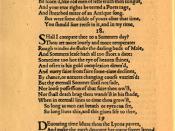Sonnet 18 by William Shakespeare is a picture of a person painted with images of summer and nature. Through these pictures, he makes you realize the warmth and beauty of the person he is writing about.
Shakespeare is trying to impress his lover by comparing them to something he finds is beautiful. He chooses summer because to him summer is a very pleasant and lovely time of year to him. In the second sentence he goes on to say she is more beautiful than a summer's day.
Then as we enter line three of Shakespeare's sonnet we read, Rough winds do shake the darling buds of May"æ Here he begins to refer to images of nature. Out of this line I take it that things might have been a little rough at first as this relationship begins, but as time passes it will turn into this great love. The image created by the bud is that it will blossom in to this beautiful thing as time passes.
William Shakespeare then in the next 4 lines of his sonnet he goes on to say that summer has some bad things such as the season is to short, and sometimes to hot. Even sometimes the sky is cover by clouds or haze, and eventually everything declines in beauty. In those four lines he also writes "every fair form fair sometime declines". Here he is talking about the changes that come with age. He says we all change with age whether it is nature's course or experiences we have had.
In "But thy summer shall not fade, nor lose possession of thou owest," the transition of his sonnet takes place. Although in the previous lines he says that beauty does decline and we do change but, in these two lines he is telling his lover that your beauty and warmth will last forever, and that they will not lose that beauty that you already posses in his heart.
Nor death brag thou wand'rest in his shade When in eternal lines to time thou owest He continues telling his beloved that their beauty will remain till they die in the lines above. Also he says that even when you skin wrinkles you will still be beautiful to me. He concludes his sonnets by telling his beloved as long as man can breath, and sees your beauty you give life to me (thee).
Shakespeare's work is full of imagery due to his use of words. He creates a vision of an everlasting love for his beloved. This is very similar to when we exchange wedding vows of ""æuntil death do us part"æ." That is were we ultimately tell our beloved that we truly love them through change and time and that you will not lose that love that you share for each






